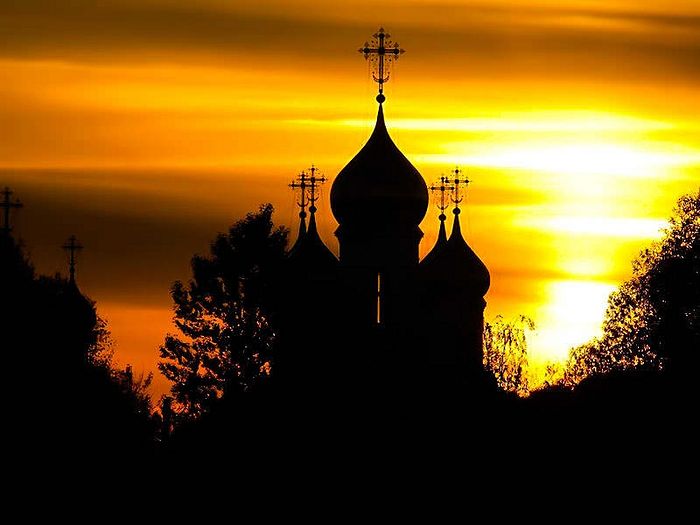The beginning of our salvation lies in a sincere comprehension of our sinfulness and the self-reproach and humility before God and people that follow as a result. A heart that is broken and humbled God will not despise (Ps. 50:19). In addition to this, it is necessary to deny ourselves (Mk. 8:34), that is, to reject our own will and understanding and to obey our superiors and mentors, as the holy fathers teach.—St. Macarius of Optina
The Lord has shown the way to everyone seeking salvation: the fulfillment of His commandments, which have been passed down to us through the Holy Gospel, and which consist in love of God and neighbor. He that hath my commandments, and keepeth them, he it is that loveth me (Jn. 14:21), said the Lord. The Holy Fathers, having in deed accomplished their journey down this path, have left us instruction on how we may also take this path, and have shown us various ways in accordance with every one of our inner-dispositions that can help us attain salvation. And just as pride is the cause of every fall, evil, and unease, so on the contrary does humility vanquish all passions and sins, and brings one tranquility according to the words of the Lord: Learn of me; for I am meek and lowly in heart: and ye shall find rest unto your souls (Mt. 11:29).—St. Macarius of Optina
How do we make progress on our path to salvation? What do you think? By surmounting great feats and thinking that we have already made progress and are on the way to salvation, thereby consoling ourselves? No, but rather our progress lies in humility—when we, while doing what is good, do not base the hope of our salvation on our good deeds, but regard ourselves as mere earth and ashes. When doing good deeds, if we begin to think highly of ourselves, then the power to do good is taken away from us and we are allowed to be overcome by the passions so that our thought may be humbled, and we begin to think of ourselves as being worse than every other created being. Or do you not know that the Lord God is more pleased with a repentant sinner than a proud righteous man? Do you understand now that the monastic vows and our very clothes serve as means that aid us in acquiring humility?—St. Macarius of Optina
The path leading to salvation must be traversed without turning away either to the left or to the right—without aspiring to reach some kind of lofty spiritual state and without wavering away into a state of idleness. Desiring to do what is good and having faith as a foundation, we must reject our own will and understanding and surrender in obedience to our spiritual father and teacher; for by doing this one begins to acquire humility, which saves the monk from all the traps and machinations of the enemy.—St. Macarius of Optina
Our salvation consists of faith and hope in the mercy of God, and in commending ourselves and each other to His holy will…—St. Macarius of Optina
Repent of the sins that you confess and then begin to lay the foundation of your improvement. The beginning of all good is humility and self-reproach, which are impossible to learn through words alone; but first of all, it is necessary to read the writings of the Holy Fathers that teach us about the monastic life and how to fight with our passions and the thoughts that the enemy assaults us with, and while continuing to read, to strive to do our best to fulfill the commandments of God, having self-reproach and asking for God’s help.—St. Macarius of Optina
God desires “all men to be saved and to come to the knowledge of the truth” (1 Tim. 2:4), but seeing from Holy Scripture that there are some who attain salvation, while others perish, are we to blame God for not granting the latter a good thought capable of leading them to Him? That would be blasphemy against God. He created man with a free will and desires that he choose the right path and seek Him. On the other hand, He is ready to help man and strengthen him in this deed. But He does not exert force over one who does not wish to choose the right path, but rather allows things to happen according to the evilness of his will, for which reason a person who does not choose the right path is himself to blame, as it is said in the Psalms: And he delighted not in blessing, and it shall be far from him (Ps. 108:17). For this reason, using our mind and free will, which God has given us, it is necessary that we ourselves choose what is good and ask Him by His good will to establish within us what we have chosen and to help us fulfill it, for Without Him we can do nothing (Jn. 15:5).
Without self-reproach, humility, patience, and love, it’s not possible to be saved; whereas through these virtues our struggle is made easier, and the cunning of the enemy is cast down.—St. Macarius of Optina
I spoke to them as much as I could about having agreement and condescension towards each other, but they fulfill this poorly in practice and say that they can’t live with each other in peace—so what is the point then? And how can they hope to be saved? Without the fruits of peace, love, and humility, even if they undertake great ascetical feats, it will bring no benefit… Without peace, love, and humility, one’s salvation is doubtful.—St. Macarius of Optina
Our salvation is with our neighbor, and it has been commanded, Let no one seek his own, but each one the other’s well-being (1 Cor. 10:24).—St. Macarius of Optina
Judging by your understanding and reasoning, it’s evident that you wish to be able to see your salvation as it were in the palm of your hand. But such a sure perception can lead one either to pride or laziness. Thus, that which is not useful is not given to people, as well as that which is untimely—that is, the premature knowledge of one’s own death.—St. Ambrose of Optina
You have a desire to bring yourself closer to God and be saved. This is the entire duty of every Christian. However, this is accomplished through the fulfillment of the commandments of God, which all consist of love of God and neighbor, and extend even to the love of our enemies. Read the Gospel, for there you will find the way, the truth, and the life… (Jn. 14:6).—St. Macarius of Optina
You write that you wish to be saved, but that your prideful inner-state hinders you greatly, and that the holy fathers write that pride completely deprives one of salvation. This is the very reason why those books were written—in order for us to reject pride and work towards attaining humility; and they teach us and give us an understanding of how to accomplish this. When you read, pay the most attention to this: How to drive away pride and obtain humility. And God will give you certain situations to help you achieve this. For example, you are insulted, rebuked, or offended by someone. How can they do this on their own if God does not allow them to? For this reason, they act as instruments that God uses for your salvation.—St. Macarius of Optina
How much sweat must one shed, and what illnesses, sorrows, sighs, labor and hardships one must endure in order to acquire eternal rest in Heaven! But we wishfully think, as do I, that lying on our sides—on a soft bed, that is, after a luxurious life, we’ll just end up straight in the Kingdom of Heaven!—St. Anatoly of Optina
One must try to be meek and humble, and then the yoke of Christ that you have taken up will be easy and light. Take care of the sick, as Christ did, and for this you’ll receive salvation and be rid of the ruthless passions while on earth. Don’t abandon that sick person, or the Lord will send another, kinder person to do it, and you’ll lose the reward prepared for you. The enemy is attacking you all the more, for your obedience is not to his liking; or perhaps he in his slyness has noticed that it will soon come to a finish and wishes to deprive you of the reward. If one seeks to receive gain for what he does, for what can such a one be rewarded? But he who readily works for Christ freely will receive a hundred times more from Him and inherit eternal life.—St. Joseph of Optina
Be attentive to your salvation while it is day; that is, you have to force yourself in every way to do every kind of good deed. I repeat: you have to force yourself, because the Kingdom of Heaven is given to those who “take it by force” (Mt. 11:12).—St. Joseph of Optina




